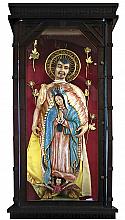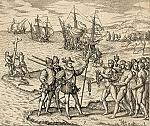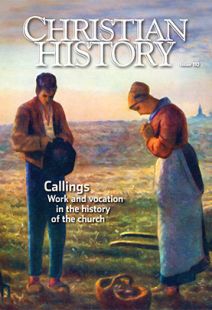Making drudgery divine?
The elixir
Teach me, my God and King, In all things thee to see,
And what I do in any thing, To do it as for thee:
Not rudely, as a beast,
To run into an action;
But still to make thee prepossessed [put first],
And give it his perfection.
A man that looks on glass,
On it may stay [keep] his eye; Or if he pleases, through it pass,
And then the heaven espy [see].
All may of thee partake:
Nothing can be so mean, Which with this tincture (for thy sake)[1]
Will not grow bright and clean.
A servant with this clause
Makes drudgery divine:
Who sweeps a room, as for thy laws,
Makes that and the action fine.
This is the famous stone
That turneth all to gold:
For that which God doth touch and own
Cannot for less be told.
The collar
I struck the board [table], and cried, “No more. I will abroad.
What? shall I ever sigh and pine?
My lines and life are free; free as the road,
Loose as the wind, as large as store. Shall I be still in suit?
Have I no harvest but a thorn
To let me blood, and not restore What I have lost with cordial fruit?
Sure there was wine Before my sighs did dry it: there was corn
Before my tears did drown it. Is the year only lost to me?
Have I no bays [gatherings of flowers] to crown it? No flowers, no garlands gay? all blasted?
All wasted? Not so, my heart: but there is fruit,
And thou hast hands. Recover all thy sigh-blown age
On double pleasures: leave thy cold dispute Of what is fit, and not. Forsake thy cage,
Thy rope of sands,
Which petty thoughts have made, and made to thee
Good cable [rope], to enforce and draw, And be thy law,
While thou didst wink and wouldst not see. Away; take heed:
I will abroad.
Call in thy death’s head there: tie up thy fears.
He that forbears To suit and serve his need, Deserves his load.”
But as I raved and grew more fierce and wild At every word,
Me thoughts I heard one calling, Child: And I replied, My Lord.
From The Temple (1633). Spelling and punctuation modernized.
[1 A “tincture” is a small amount that is added to affect the whole.]
By George Herbert
[Christian History originally published this article in Christian History Issue #110 in 2014]
Geroge Herbert was an Anglican priest and poet.Next articles
Latin American Christianity, Did you know?
Mistaken identity, apostolic number, the tenth muse, and Calvin’s hope
the editorsEditor's note: Latin American Christianity
The desires, faith, and practices of elite colonizers, politicians, and church bureaucrats opposed those of the poor, enslaved, and oppressed.
Jennifer Woodruff TaitSupport us
Christian History Institute (CHI) is a non-profit Pennsylvania corporation founded in 1982. Your donations support the continuation of this ministry
Donate





